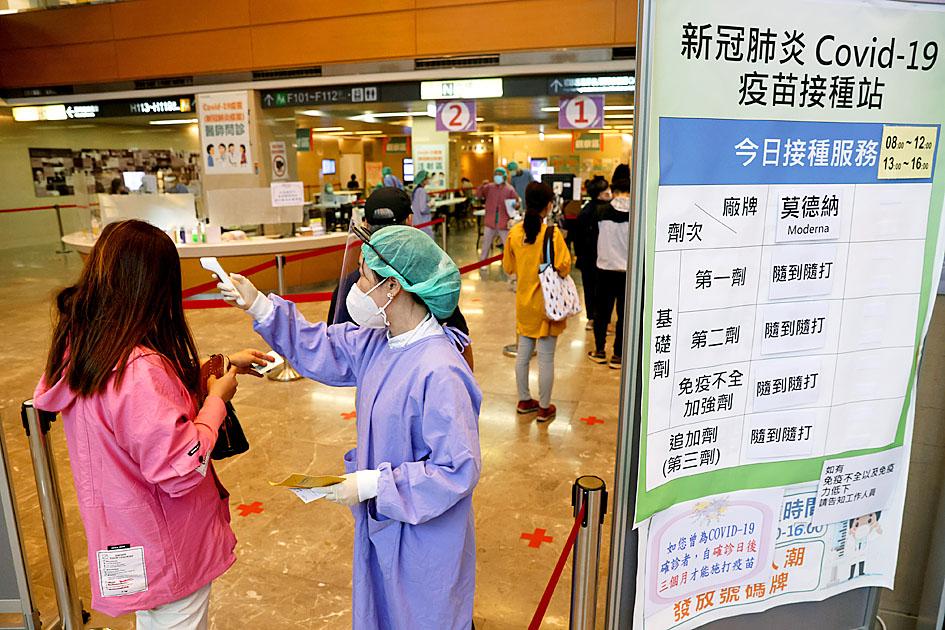As of Wednesday last week, 4,948 complaints about COVID-19 insurance had been filed with the Financial Ombudsman Institution (FOI, 金融消費評議中心) — 25 times higher than the 189 complaints for the whole of last year, official figures showed.
Only 6.6 percent of the complaints, or 331, had been settled by insurers and policyholders, leaving 4,617 unresolved, the data showed.
In contrast, 55 percent of all 189 complaints last year were resolved, the agency said.

Photo: Bloomberg
The FOI said it steps in to help solve complaints if consumers are not satisfied with the solutions provided by financial firms.
The agency could advise financial firms to pay up to NT$1.2 million (US$40,293) in compensation if it thinks consumers make a case for their complaints, it said, adding that the whole process takes less than five months.
As of Wednesday last week, 69 consumers had asked the FOI to review their complaints, and the agency had reconciled conflicts for 21 cases and given advice about compensation for three cases, it said.
The most common complaints are insurers refusing to validate a policy purchase or pay compensation for positive COVID-19 infections based on rapid antigen test results, the agency said.
Twelve non-life insurers have promised the Financial Supervisory Commission (FSC) that they would finish writing off all COVID-19 insurance policies by the end of this month, and about 550,000 purchases are still being addressed, the commission’s data showed.
Data showed that so far this year, 5 million COVID-19 insurance policies have been sold.
In related news, as the Central Epidemic Command Center (CECC) yesterday announced that it is listing monkeypox as a category 2 notifiable communicable disease, the FSC said that the insurers would also have to compensate those who purchase insurance against notifiable diseases.

Stephen Garrett, a 27-year-old graduate student, always thought he would study in China, but first the country’s restrictive COVID-19 policies made it nearly impossible and now he has other concerns. The cost is one deterrent, but Garrett is more worried about restrictions on academic freedom and the personal risk of being stranded in China. He is not alone. Only about 700 American students are studying at Chinese universities, down from a peak of nearly 25,000 a decade ago, while there are nearly 300,000 Chinese students at US schools. Some young Americans are discouraged from investing their time in China by what they see

Taiwan Transport and Storage Corp (TTS, 台灣通運倉儲) yesterday unveiled its first electric tractor unit — manufactured by Volvo Trucks — in a ceremony in Taipei, and said the unit would soon be used to transport cement produced by Taiwan Cement Corp (TCC, 台灣水泥). Both TTS and TCC belong to TCC International Holdings Ltd (台泥國際集團). With the electric tractor unit, the Taipei-based cement firm would become the first in Taiwan to use electric vehicles to transport construction materials. TTS chairman Koo Kung-yi (辜公怡), Volvo Trucks vice president of sales and marketing Johan Selven, TCC president Roman Cheng (程耀輝) and Taikoo Motors Group

MAJOR DROP: CEO Tim Cook, who is visiting Hanoi, pledged the firm was committed to Vietnam after its smartphone shipments declined 9.6% annually in the first quarter Apple Inc yesterday said it would increase spending on suppliers in Vietnam, a key production hub, as CEO Tim Cook arrived in the country for a two-day visit. The iPhone maker announced the news in a statement on its Web site, but gave no details of how much it would spend or where the money would go. Cook is expected to meet programmers, content creators and students during his visit, online newspaper VnExpress reported. The visit comes as US President Joe Biden’s administration seeks to ramp up Vietnam’s role in the global tech supply chain to reduce the US’ dependence on China. Images on

New apartments in Taiwan’s major cities are getting smaller, while old apartments are increasingly occupied by older people, many of whom live alone, government data showed. The phenomenon has to do with sharpening unaffordable property prices and an aging population, property brokers said. Apartments with one bedroom that are two years old or older have gained a noticeable presence in the nation’s six special municipalities as well as Hsinchu county and city in the past five years, Evertrust Rehouse Co (永慶房產集團) found, citing data from the government’s real-price transaction platform. In Taipei, apartments with one bedroom accounted for 19 percent of deals last